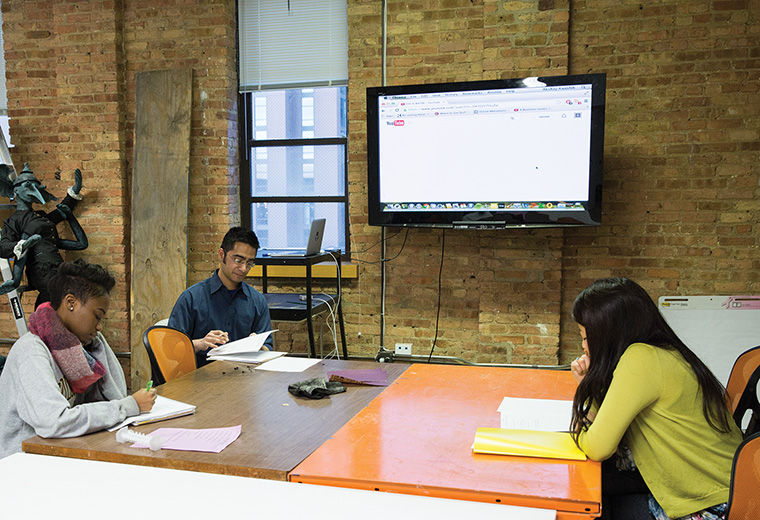Workshop discusses student diversity, culture
Chido Nzvere (left), Akshay Kaushik (center) and Tomoe Yunoki (right) discuss how to improve the lack of communication and understanding between cultures.
December 8, 2014
Columbia’s Leadership Institute hosted a workshop for students called “Who Am I? Cultural Identity” Dec. 3 that covered the importance of cultural diversity and identity in the college’s student body.
The workshop, co-hosted with the Student Activities Department, was held in The Loft at the 916 S. Wabash Ave. Building. The importance of cultural awareness, perspective, fostering inclusion among the many different ethnicities on campus, combating stereotypes and other social issues were discussed.
Akshay Kaushik, a business & entrepreneurship graduate student, told those present his interest in attending the workshop stemmed in part from his involvement as a graduate assistant to the Leadership Institute as well as from his interest in how Columbia seeks to reduce the cultural divide.
“As a leader and a follower also, you have to be aware of perspectives,” Kaushik said. “People come from different places, and you have to understand where they’re coming from.”
Kaushik said he has noticed in his time as a graduate student that students form cliques from which they rarely deviate. He said students need to be able to branch out and connect with different people through understanding conversations about how to bridge cultural gaps with their peers. He added that opportunities should be made for students of different backgrounds to communicate and rid the college of racially driven stereotypes.
“[These conversations] are definitely needed on a larger scale and more regularly [and] also just to let people know that it’s OK to ask these questions,” Kaushik said.
Chido Nzvere, a junior journalism major, said her sundry background sparked her interest in continuing to learn about other cultures. Nzvere said she appreciated the opportunity to participate in a discussion about everyday issues of prejudice and culture that people normally avoid or ignore, such as race, gender appropriation, cultural customs and the need for these conversations.
“I am intrigued with other cultures, and I like to get to know other people the same way I would want them to get to know me before they start judging me,” Nzvere said.
Nzvere said she would encourage friends to come to similar workshops, and she said she hopes Columbia is working on ways to make students aware of opportunities to connect with peers of different cultures. Focusing on the promotion of diversity and communication may be beneficial in the classroom setting by enabling students to work with people who may not be similar to them, Nzvere said.
“Instead of us being taught what not to say and what’s offensive, us actually sitting down and having such a diverse group of people to speak to … we can all discuss the issues,” Nzvere said. “Once you leave that type of meeting, you don’t leave feeling like you’ve been yelled at or scolded. You leave knowing how to approach the next person and be a little more sensitive.”
Tomoe Yunoki, a sophomore art + design major, said a class she took her freshman year on culture and ethnicity is what prompted her to take advantage of all other opportunities to connect with people of different cultures because she enjoyed the dialogue.
Yunoki said ethnicity was never a topic of discussion where she was raised in Japan, and it was only by moving to the U.S. and attending college that her race became an issue. However, she said her interest in learning more about different cultures grew from that realization, and she said she intends to learn as much as she can about other cultures from other students.
“Unless [students] feel this is very personal or we can connect to the problem or issue, we don’t really care,” Yunoki said. “But if we really have something to think about, we would take advantage of the workshop opportunity. Having [a] discussion is always helpful to understand each other and go farther.”








